Employment Contracts: Analysis of Advantages and Disadvantages for HR
VerifiedAdded on 2023/01/05
|11
|3701
|21
Report
AI Summary
This report delves into the realm of human resource management by examining various employment contracts and their implications. It begins by defining employment contracts and their significance in labor law, highlighting the rights and responsibilities of both employers and employees. The report then compares and contrasts different contract types, including permanent full-time, permanent part-time, and zero-hour casual contracts. For each type, the analysis covers the advantages and disadvantages from the perspectives of both employees and employers, providing insights into aspects such as job security, flexibility, benefits, and potential drawbacks. The report offers real-world examples and explores the implications of these contracts on employee performance and organizational goals, concluding with a comprehensive overview of the benefits and challenges associated with each type of contract.

MANAGING HUMAN
RESOURCES
RESOURCES
Paraphrase This Document
Need a fresh take? Get an instant paraphrase of this document with our AI Paraphraser
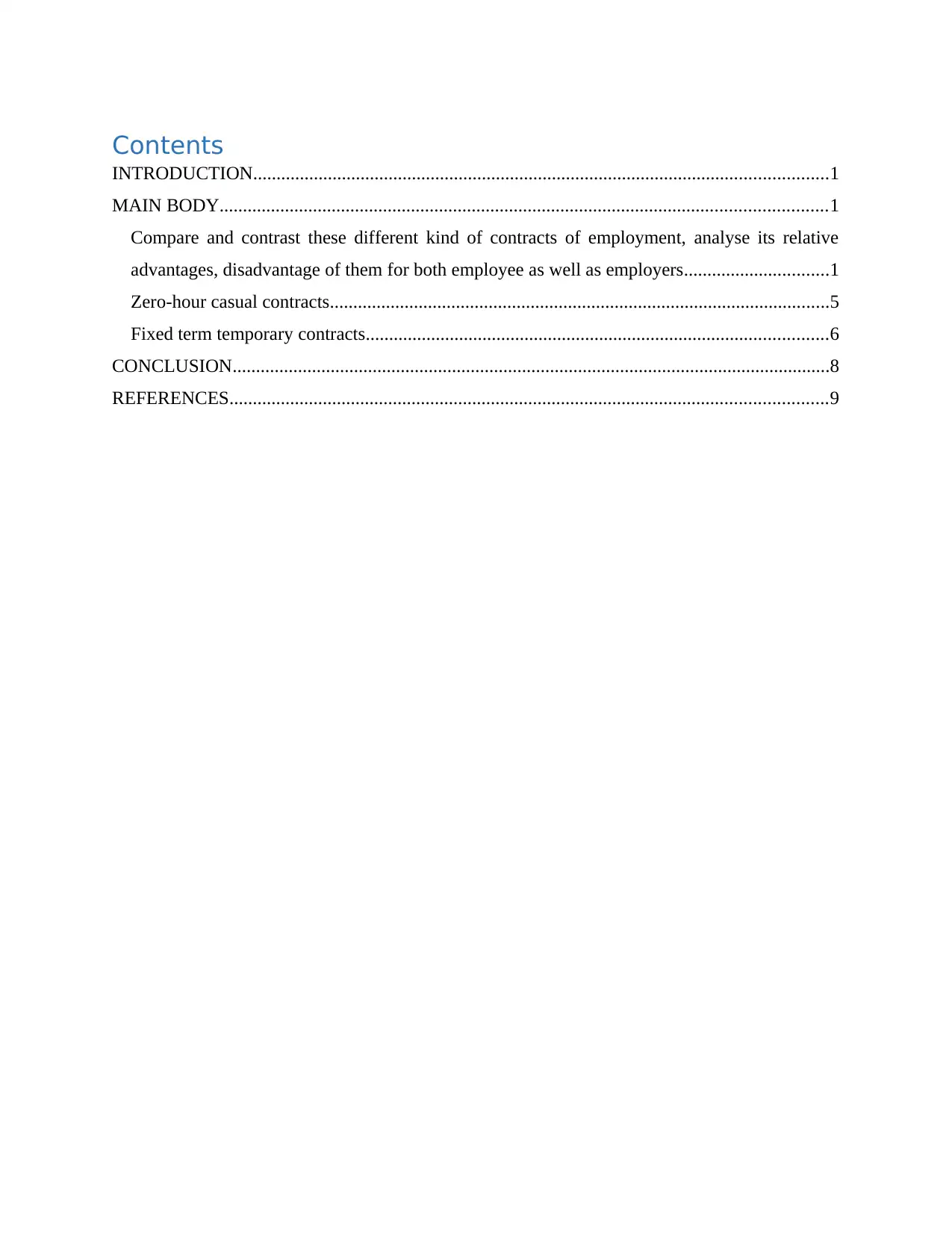
Contents
INTRODUCTION...........................................................................................................................1
MAIN BODY..................................................................................................................................1
Compare and contrast these different kind of contracts of employment, analyse its relative
advantages, disadvantage of them for both employee as well as employers...............................1
Zero-hour casual contracts...........................................................................................................5
Fixed term temporary contracts...................................................................................................6
CONCLUSION................................................................................................................................8
REFERENCES................................................................................................................................9
INTRODUCTION...........................................................................................................................1
MAIN BODY..................................................................................................................................1
Compare and contrast these different kind of contracts of employment, analyse its relative
advantages, disadvantage of them for both employee as well as employers...............................1
Zero-hour casual contracts...........................................................................................................5
Fixed term temporary contracts...................................................................................................6
CONCLUSION................................................................................................................................8
REFERENCES................................................................................................................................9
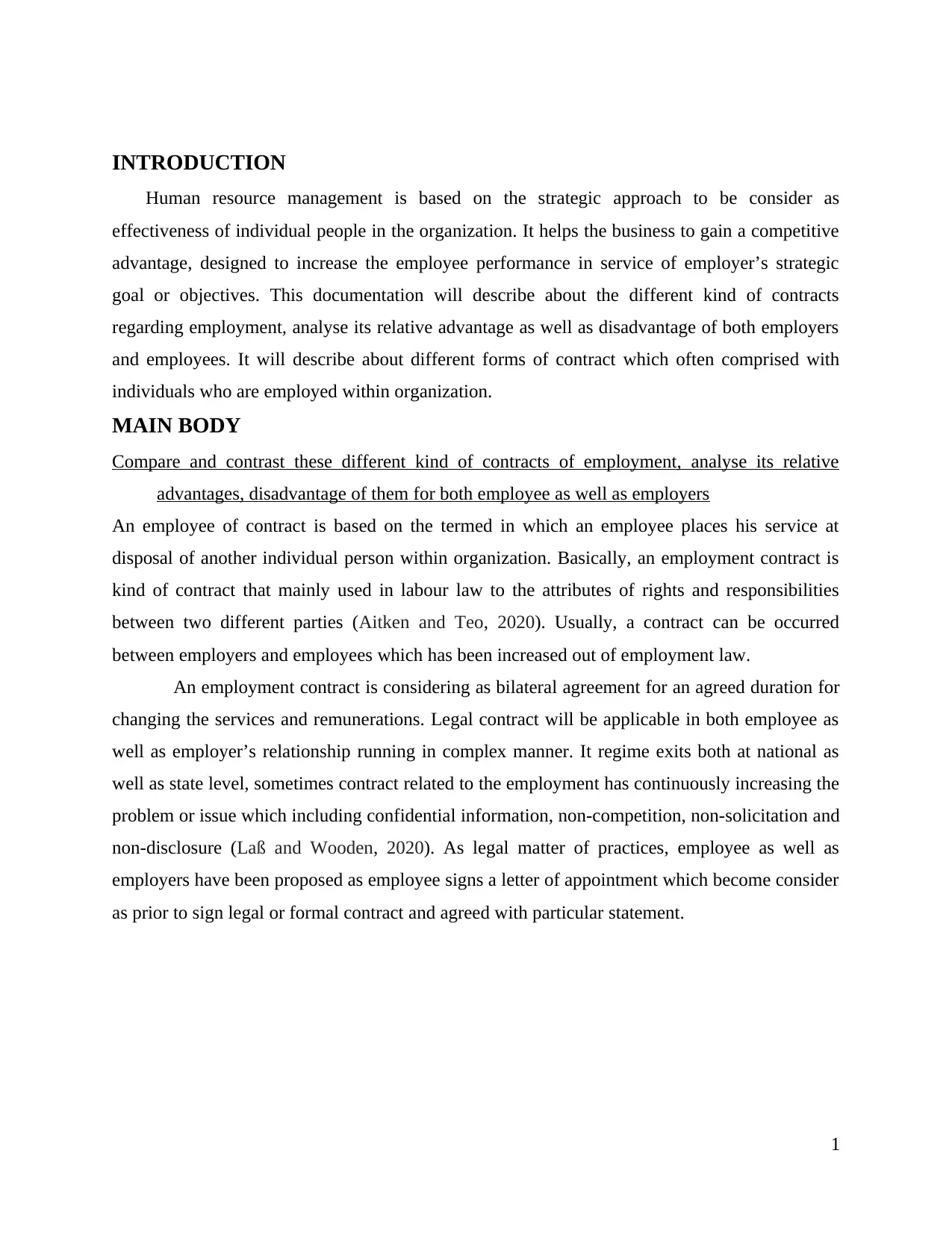
INTRODUCTION
Human resource management is based on the strategic approach to be consider as
effectiveness of individual people in the organization. It helps the business to gain a competitive
advantage, designed to increase the employee performance in service of employer’s strategic
goal or objectives. This documentation will describe about the different kind of contracts
regarding employment, analyse its relative advantage as well as disadvantage of both employers
and employees. It will describe about different forms of contract which often comprised with
individuals who are employed within organization.
MAIN BODY
Compare and contrast these different kind of contracts of employment, analyse its relative
advantages, disadvantage of them for both employee as well as employers
An employee of contract is based on the termed in which an employee places his service at
disposal of another individual person within organization. Basically, an employment contract is
kind of contract that mainly used in labour law to the attributes of rights and responsibilities
between two different parties (Aitken and Teo, 2020). Usually, a contract can be occurred
between employers and employees which has been increased out of employment law.
An employment contract is considering as bilateral agreement for an agreed duration for
changing the services and remunerations. Legal contract will be applicable in both employee as
well as employer’s relationship running in complex manner. It regime exits both at national as
well as state level, sometimes contract related to the employment has continuously increasing the
problem or issue which including confidential information, non-competition, non-solicitation and
non-disclosure (Laß and Wooden, 2020). As legal matter of practices, employee as well as
employers have been proposed as employee signs a letter of appointment which become consider
as prior to sign legal or formal contract and agreed with particular statement.
1
Human resource management is based on the strategic approach to be consider as
effectiveness of individual people in the organization. It helps the business to gain a competitive
advantage, designed to increase the employee performance in service of employer’s strategic
goal or objectives. This documentation will describe about the different kind of contracts
regarding employment, analyse its relative advantage as well as disadvantage of both employers
and employees. It will describe about different forms of contract which often comprised with
individuals who are employed within organization.
MAIN BODY
Compare and contrast these different kind of contracts of employment, analyse its relative
advantages, disadvantage of them for both employee as well as employers
An employee of contract is based on the termed in which an employee places his service at
disposal of another individual person within organization. Basically, an employment contract is
kind of contract that mainly used in labour law to the attributes of rights and responsibilities
between two different parties (Aitken and Teo, 2020). Usually, a contract can be occurred
between employers and employees which has been increased out of employment law.
An employment contract is considering as bilateral agreement for an agreed duration for
changing the services and remunerations. Legal contract will be applicable in both employee as
well as employer’s relationship running in complex manner. It regime exits both at national as
well as state level, sometimes contract related to the employment has continuously increasing the
problem or issue which including confidential information, non-competition, non-solicitation and
non-disclosure (Laß and Wooden, 2020). As legal matter of practices, employee as well as
employers have been proposed as employee signs a letter of appointment which become consider
as prior to sign legal or formal contract and agreed with particular statement.
1
⊘ This is a preview!⊘
Do you want full access?
Subscribe today to unlock all pages.

Trusted by 1+ million students worldwide
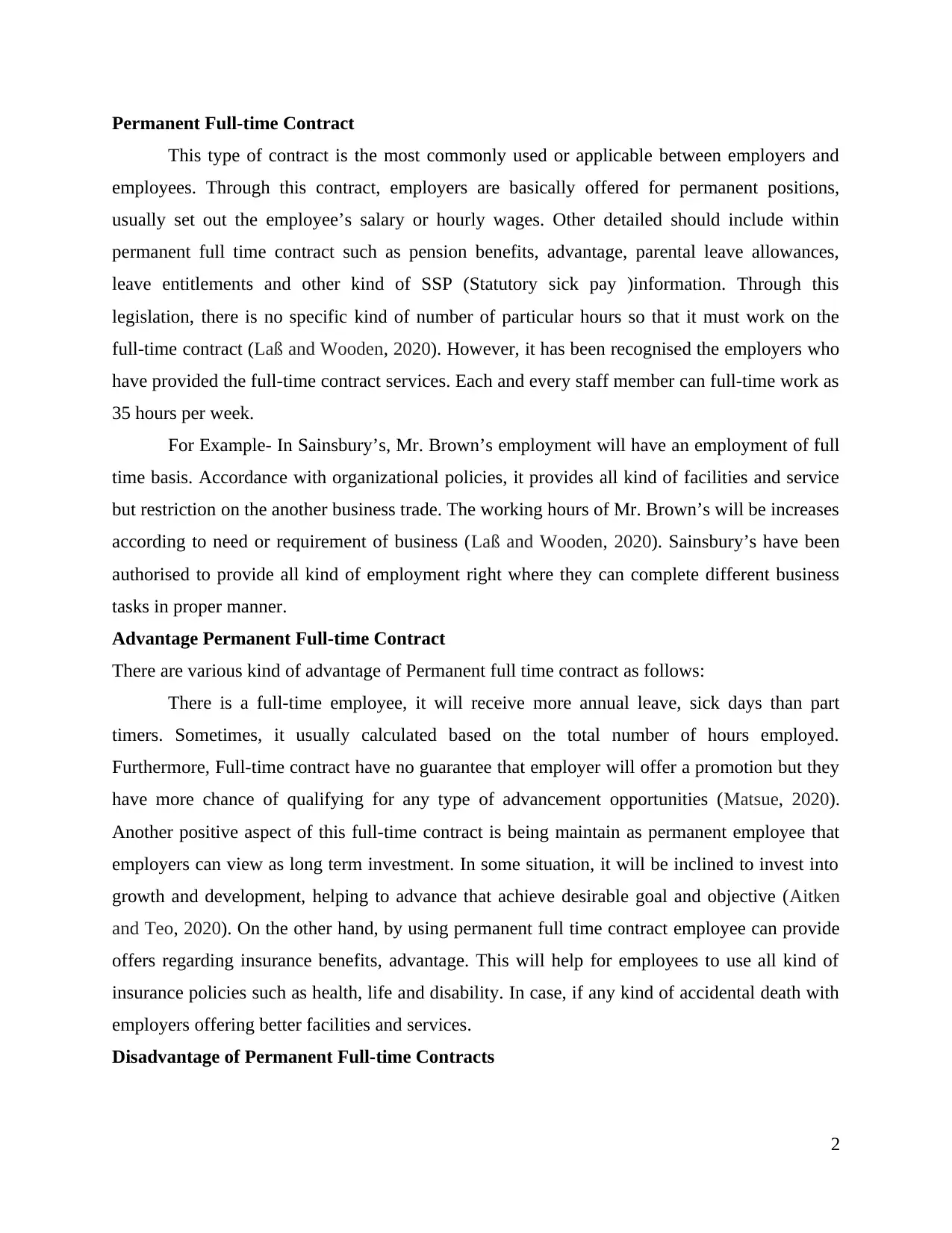
Permanent Full-time Contract
This type of contract is the most commonly used or applicable between employers and
employees. Through this contract, employers are basically offered for permanent positions,
usually set out the employee’s salary or hourly wages. Other detailed should include within
permanent full time contract such as pension benefits, advantage, parental leave allowances,
leave entitlements and other kind of SSP (Statutory sick pay )information. Through this
legislation, there is no specific kind of number of particular hours so that it must work on the
full-time contract (Laß and Wooden, 2020). However, it has been recognised the employers who
have provided the full-time contract services. Each and every staff member can full-time work as
35 hours per week.
For Example- In Sainsbury’s, Mr. Brown’s employment will have an employment of full
time basis. Accordance with organizational policies, it provides all kind of facilities and service
but restriction on the another business trade. The working hours of Mr. Brown’s will be increases
according to need or requirement of business (Laß and Wooden, 2020). Sainsbury’s have been
authorised to provide all kind of employment right where they can complete different business
tasks in proper manner.
Advantage Permanent Full-time Contract
There are various kind of advantage of Permanent full time contract as follows:
There is a full-time employee, it will receive more annual leave, sick days than part
timers. Sometimes, it usually calculated based on the total number of hours employed.
Furthermore, Full-time contract have no guarantee that employer will offer a promotion but they
have more chance of qualifying for any type of advancement opportunities (Matsue, 2020).
Another positive aspect of this full-time contract is being maintain as permanent employee that
employers can view as long term investment. In some situation, it will be inclined to invest into
growth and development, helping to advance that achieve desirable goal and objective (Aitken
and Teo, 2020). On the other hand, by using permanent full time contract employee can provide
offers regarding insurance benefits, advantage. This will help for employees to use all kind of
insurance policies such as health, life and disability. In case, if any kind of accidental death with
employers offering better facilities and services.
Disadvantage of Permanent Full-time Contracts
2
This type of contract is the most commonly used or applicable between employers and
employees. Through this contract, employers are basically offered for permanent positions,
usually set out the employee’s salary or hourly wages. Other detailed should include within
permanent full time contract such as pension benefits, advantage, parental leave allowances,
leave entitlements and other kind of SSP (Statutory sick pay )information. Through this
legislation, there is no specific kind of number of particular hours so that it must work on the
full-time contract (Laß and Wooden, 2020). However, it has been recognised the employers who
have provided the full-time contract services. Each and every staff member can full-time work as
35 hours per week.
For Example- In Sainsbury’s, Mr. Brown’s employment will have an employment of full
time basis. Accordance with organizational policies, it provides all kind of facilities and service
but restriction on the another business trade. The working hours of Mr. Brown’s will be increases
according to need or requirement of business (Laß and Wooden, 2020). Sainsbury’s have been
authorised to provide all kind of employment right where they can complete different business
tasks in proper manner.
Advantage Permanent Full-time Contract
There are various kind of advantage of Permanent full time contract as follows:
There is a full-time employee, it will receive more annual leave, sick days than part
timers. Sometimes, it usually calculated based on the total number of hours employed.
Furthermore, Full-time contract have no guarantee that employer will offer a promotion but they
have more chance of qualifying for any type of advancement opportunities (Matsue, 2020).
Another positive aspect of this full-time contract is being maintain as permanent employee that
employers can view as long term investment. In some situation, it will be inclined to invest into
growth and development, helping to advance that achieve desirable goal and objective (Aitken
and Teo, 2020). On the other hand, by using permanent full time contract employee can provide
offers regarding insurance benefits, advantage. This will help for employees to use all kind of
insurance policies such as health, life and disability. In case, if any kind of accidental death with
employers offering better facilities and services.
Disadvantage of Permanent Full-time Contracts
2
Paraphrase This Document
Need a fresh take? Get an instant paraphrase of this document with our AI Paraphraser
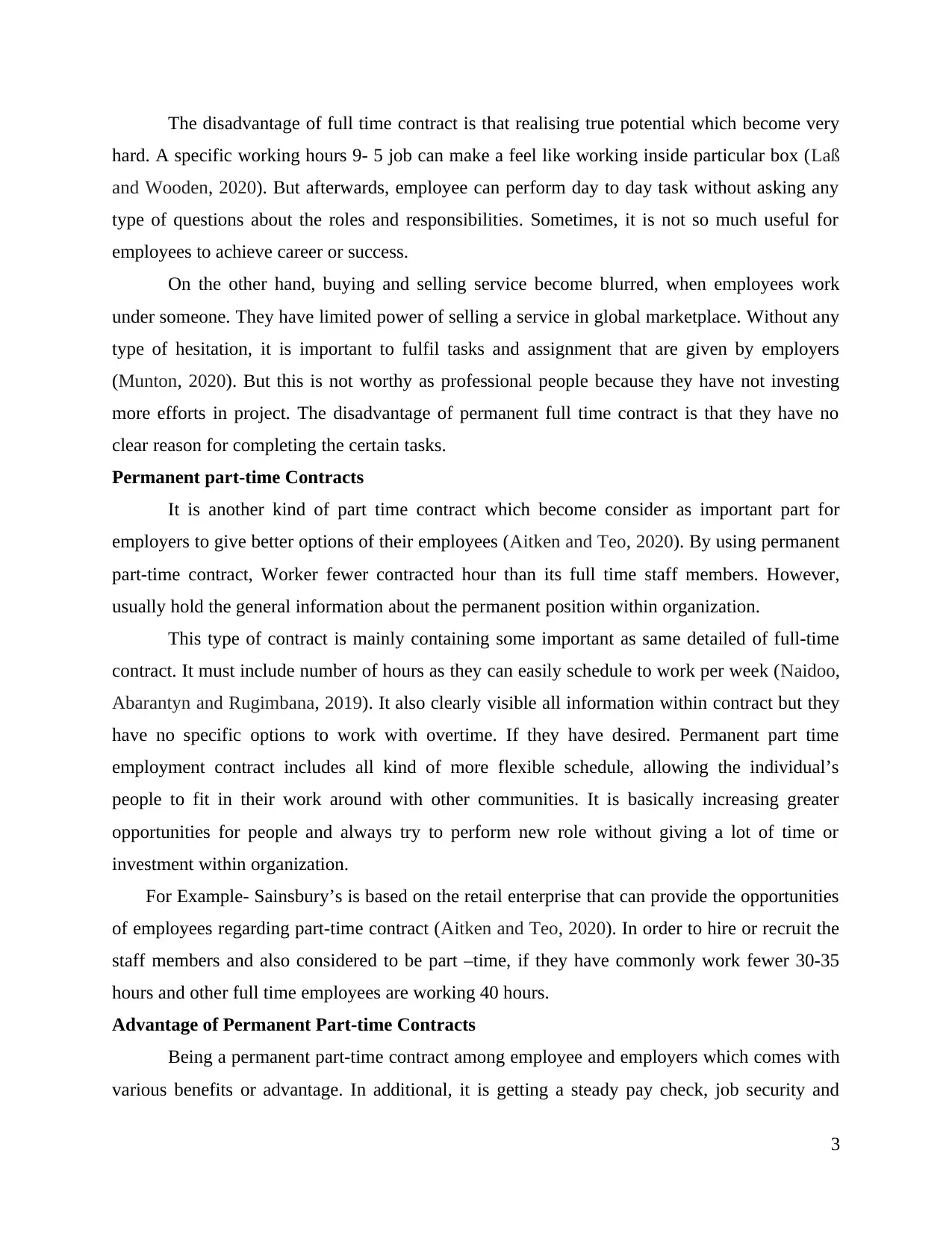
The disadvantage of full time contract is that realising true potential which become very
hard. A specific working hours 9- 5 job can make a feel like working inside particular box (Laß
and Wooden, 2020). But afterwards, employee can perform day to day task without asking any
type of questions about the roles and responsibilities. Sometimes, it is not so much useful for
employees to achieve career or success.
On the other hand, buying and selling service become blurred, when employees work
under someone. They have limited power of selling a service in global marketplace. Without any
type of hesitation, it is important to fulfil tasks and assignment that are given by employers
(Munton, 2020). But this is not worthy as professional people because they have not investing
more efforts in project. The disadvantage of permanent full time contract is that they have no
clear reason for completing the certain tasks.
Permanent part-time Contracts
It is another kind of part time contract which become consider as important part for
employers to give better options of their employees (Aitken and Teo, 2020). By using permanent
part-time contract, Worker fewer contracted hour than its full time staff members. However,
usually hold the general information about the permanent position within organization.
This type of contract is mainly containing some important as same detailed of full-time
contract. It must include number of hours as they can easily schedule to work per week (Naidoo,
Abarantyn and Rugimbana, 2019). It also clearly visible all information within contract but they
have no specific options to work with overtime. If they have desired. Permanent part time
employment contract includes all kind of more flexible schedule, allowing the individual’s
people to fit in their work around with other communities. It is basically increasing greater
opportunities for people and always try to perform new role without giving a lot of time or
investment within organization.
For Example- Sainsbury’s is based on the retail enterprise that can provide the opportunities
of employees regarding part-time contract (Aitken and Teo, 2020). In order to hire or recruit the
staff members and also considered to be part –time, if they have commonly work fewer 30-35
hours and other full time employees are working 40 hours.
Advantage of Permanent Part-time Contracts
Being a permanent part-time contract among employee and employers which comes with
various benefits or advantage. In additional, it is getting a steady pay check, job security and
3
hard. A specific working hours 9- 5 job can make a feel like working inside particular box (Laß
and Wooden, 2020). But afterwards, employee can perform day to day task without asking any
type of questions about the roles and responsibilities. Sometimes, it is not so much useful for
employees to achieve career or success.
On the other hand, buying and selling service become blurred, when employees work
under someone. They have limited power of selling a service in global marketplace. Without any
type of hesitation, it is important to fulfil tasks and assignment that are given by employers
(Munton, 2020). But this is not worthy as professional people because they have not investing
more efforts in project. The disadvantage of permanent full time contract is that they have no
clear reason for completing the certain tasks.
Permanent part-time Contracts
It is another kind of part time contract which become consider as important part for
employers to give better options of their employees (Aitken and Teo, 2020). By using permanent
part-time contract, Worker fewer contracted hour than its full time staff members. However,
usually hold the general information about the permanent position within organization.
This type of contract is mainly containing some important as same detailed of full-time
contract. It must include number of hours as they can easily schedule to work per week (Naidoo,
Abarantyn and Rugimbana, 2019). It also clearly visible all information within contract but they
have no specific options to work with overtime. If they have desired. Permanent part time
employment contract includes all kind of more flexible schedule, allowing the individual’s
people to fit in their work around with other communities. It is basically increasing greater
opportunities for people and always try to perform new role without giving a lot of time or
investment within organization.
For Example- Sainsbury’s is based on the retail enterprise that can provide the opportunities
of employees regarding part-time contract (Aitken and Teo, 2020). In order to hire or recruit the
staff members and also considered to be part –time, if they have commonly work fewer 30-35
hours and other full time employees are working 40 hours.
Advantage of Permanent Part-time Contracts
Being a permanent part-time contract among employee and employers which comes with
various benefits or advantage. In additional, it is getting a steady pay check, job security and
3
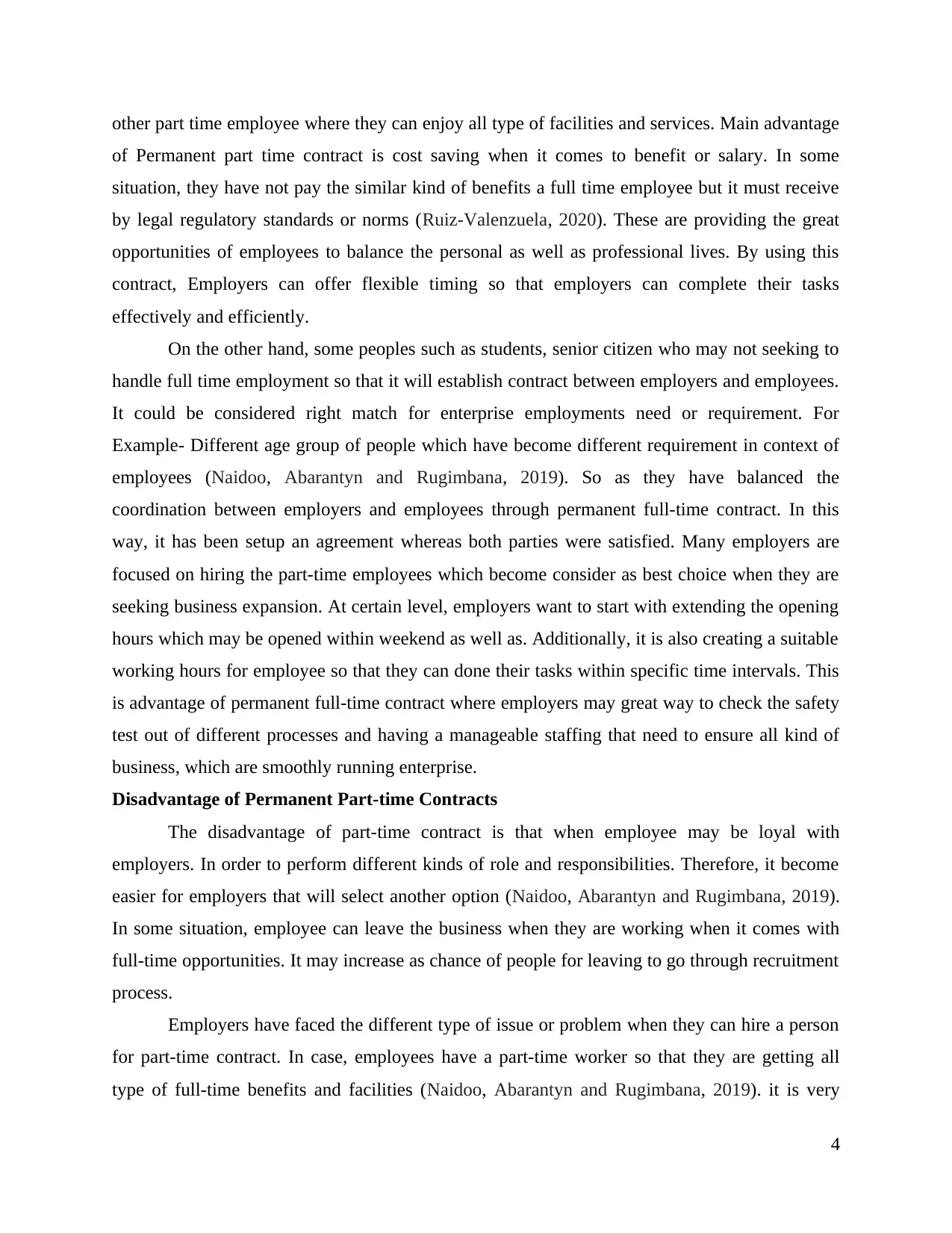
other part time employee where they can enjoy all type of facilities and services. Main advantage
of Permanent part time contract is cost saving when it comes to benefit or salary. In some
situation, they have not pay the similar kind of benefits a full time employee but it must receive
by legal regulatory standards or norms (Ruiz-Valenzuela, 2020). These are providing the great
opportunities of employees to balance the personal as well as professional lives. By using this
contract, Employers can offer flexible timing so that employers can complete their tasks
effectively and efficiently.
On the other hand, some peoples such as students, senior citizen who may not seeking to
handle full time employment so that it will establish contract between employers and employees.
It could be considered right match for enterprise employments need or requirement. For
Example- Different age group of people which have become different requirement in context of
employees (Naidoo, Abarantyn and Rugimbana, 2019). So as they have balanced the
coordination between employers and employees through permanent full-time contract. In this
way, it has been setup an agreement whereas both parties were satisfied. Many employers are
focused on hiring the part-time employees which become consider as best choice when they are
seeking business expansion. At certain level, employers want to start with extending the opening
hours which may be opened within weekend as well as. Additionally, it is also creating a suitable
working hours for employee so that they can done their tasks within specific time intervals. This
is advantage of permanent full-time contract where employers may great way to check the safety
test out of different processes and having a manageable staffing that need to ensure all kind of
business, which are smoothly running enterprise.
Disadvantage of Permanent Part-time Contracts
The disadvantage of part-time contract is that when employee may be loyal with
employers. In order to perform different kinds of role and responsibilities. Therefore, it become
easier for employers that will select another option (Naidoo, Abarantyn and Rugimbana, 2019).
In some situation, employee can leave the business when they are working when it comes with
full-time opportunities. It may increase as chance of people for leaving to go through recruitment
process.
Employers have faced the different type of issue or problem when they can hire a person
for part-time contract. In case, employees have a part-time worker so that they are getting all
type of full-time benefits and facilities (Naidoo, Abarantyn and Rugimbana, 2019). it is very
4
of Permanent part time contract is cost saving when it comes to benefit or salary. In some
situation, they have not pay the similar kind of benefits a full time employee but it must receive
by legal regulatory standards or norms (Ruiz-Valenzuela, 2020). These are providing the great
opportunities of employees to balance the personal as well as professional lives. By using this
contract, Employers can offer flexible timing so that employers can complete their tasks
effectively and efficiently.
On the other hand, some peoples such as students, senior citizen who may not seeking to
handle full time employment so that it will establish contract between employers and employees.
It could be considered right match for enterprise employments need or requirement. For
Example- Different age group of people which have become different requirement in context of
employees (Naidoo, Abarantyn and Rugimbana, 2019). So as they have balanced the
coordination between employers and employees through permanent full-time contract. In this
way, it has been setup an agreement whereas both parties were satisfied. Many employers are
focused on hiring the part-time employees which become consider as best choice when they are
seeking business expansion. At certain level, employers want to start with extending the opening
hours which may be opened within weekend as well as. Additionally, it is also creating a suitable
working hours for employee so that they can done their tasks within specific time intervals. This
is advantage of permanent full-time contract where employers may great way to check the safety
test out of different processes and having a manageable staffing that need to ensure all kind of
business, which are smoothly running enterprise.
Disadvantage of Permanent Part-time Contracts
The disadvantage of part-time contract is that when employee may be loyal with
employers. In order to perform different kinds of role and responsibilities. Therefore, it become
easier for employers that will select another option (Naidoo, Abarantyn and Rugimbana, 2019).
In some situation, employee can leave the business when they are working when it comes with
full-time opportunities. It may increase as chance of people for leaving to go through recruitment
process.
Employers have faced the different type of issue or problem when they can hire a person
for part-time contract. In case, employees have a part-time worker so that they are getting all
type of full-time benefits and facilities (Naidoo, Abarantyn and Rugimbana, 2019). it is very
4
⊘ This is a preview!⊘
Do you want full access?
Subscribe today to unlock all pages.

Trusted by 1+ million students worldwide
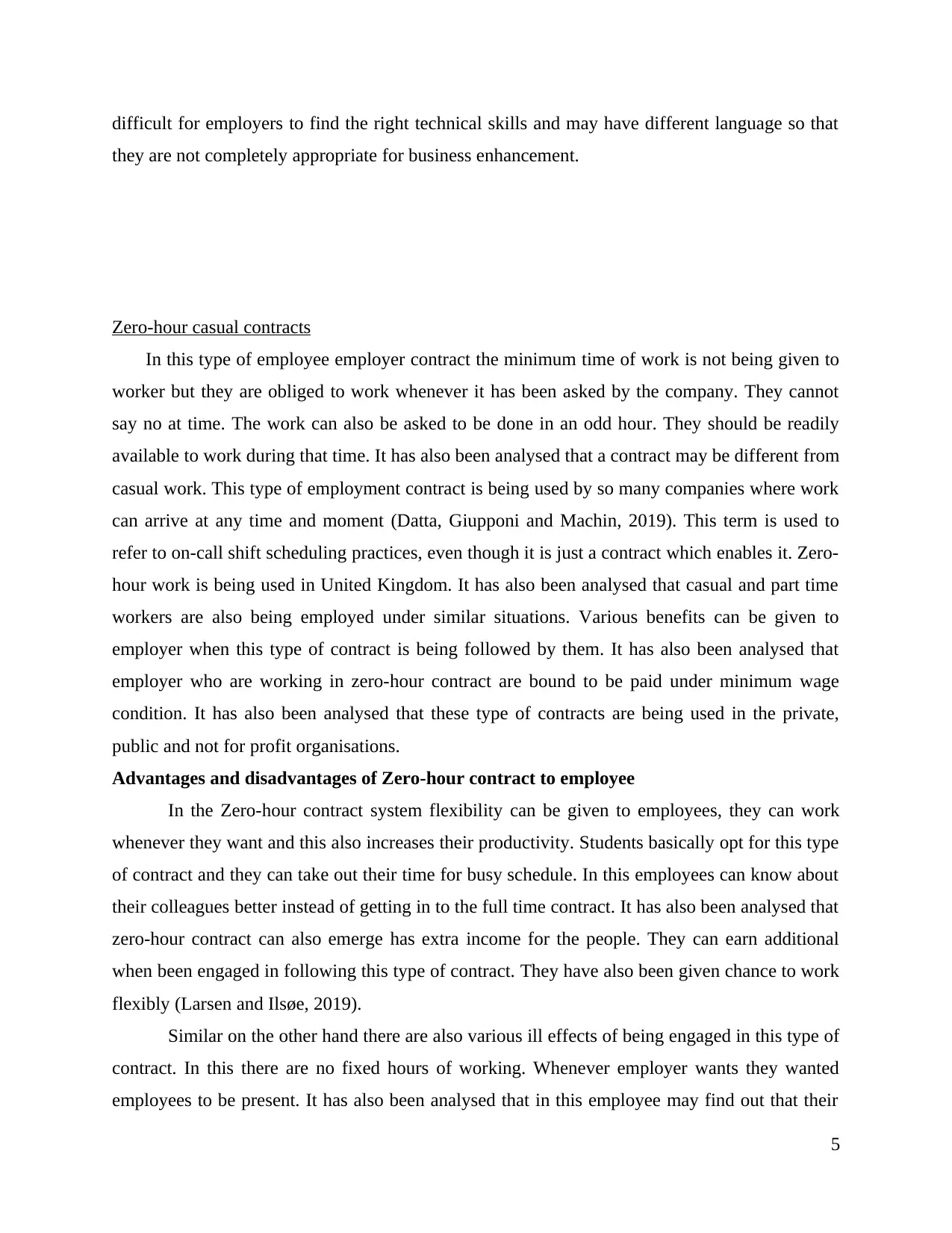
difficult for employers to find the right technical skills and may have different language so that
they are not completely appropriate for business enhancement.
Zero-hour casual contracts
In this type of employee employer contract the minimum time of work is not being given to
worker but they are obliged to work whenever it has been asked by the company. They cannot
say no at time. The work can also be asked to be done in an odd hour. They should be readily
available to work during that time. It has also been analysed that a contract may be different from
casual work. This type of employment contract is being used by so many companies where work
can arrive at any time and moment (Datta, Giupponi and Machin, 2019). This term is used to
refer to on-call shift scheduling practices, even though it is just a contract which enables it. Zero-
hour work is being used in United Kingdom. It has also been analysed that casual and part time
workers are also being employed under similar situations. Various benefits can be given to
employer when this type of contract is being followed by them. It has also been analysed that
employer who are working in zero-hour contract are bound to be paid under minimum wage
condition. It has also been analysed that these type of contracts are being used in the private,
public and not for profit organisations.
Advantages and disadvantages of Zero-hour contract to employee
In the Zero-hour contract system flexibility can be given to employees, they can work
whenever they want and this also increases their productivity. Students basically opt for this type
of contract and they can take out their time for busy schedule. In this employees can know about
their colleagues better instead of getting in to the full time contract. It has also been analysed that
zero-hour contract can also emerge has extra income for the people. They can earn additional
when been engaged in following this type of contract. They have also been given chance to work
flexibly (Larsen and Ilsøe, 2019).
Similar on the other hand there are also various ill effects of being engaged in this type of
contract. In this there are no fixed hours of working. Whenever employer wants they wanted
employees to be present. It has also been analysed that in this employee may find out that their
5
they are not completely appropriate for business enhancement.
Zero-hour casual contracts
In this type of employee employer contract the minimum time of work is not being given to
worker but they are obliged to work whenever it has been asked by the company. They cannot
say no at time. The work can also be asked to be done in an odd hour. They should be readily
available to work during that time. It has also been analysed that a contract may be different from
casual work. This type of employment contract is being used by so many companies where work
can arrive at any time and moment (Datta, Giupponi and Machin, 2019). This term is used to
refer to on-call shift scheduling practices, even though it is just a contract which enables it. Zero-
hour work is being used in United Kingdom. It has also been analysed that casual and part time
workers are also being employed under similar situations. Various benefits can be given to
employer when this type of contract is being followed by them. It has also been analysed that
employer who are working in zero-hour contract are bound to be paid under minimum wage
condition. It has also been analysed that these type of contracts are being used in the private,
public and not for profit organisations.
Advantages and disadvantages of Zero-hour contract to employee
In the Zero-hour contract system flexibility can be given to employees, they can work
whenever they want and this also increases their productivity. Students basically opt for this type
of contract and they can take out their time for busy schedule. In this employees can know about
their colleagues better instead of getting in to the full time contract. It has also been analysed that
zero-hour contract can also emerge has extra income for the people. They can earn additional
when been engaged in following this type of contract. They have also been given chance to work
flexibly (Larsen and Ilsøe, 2019).
Similar on the other hand there are also various ill effects of being engaged in this type of
contract. In this there are no fixed hours of working. Whenever employer wants they wanted
employees to be present. It has also been analysed that in this employee may find out that their
5
Paraphrase This Document
Need a fresh take? Get an instant paraphrase of this document with our AI Paraphraser
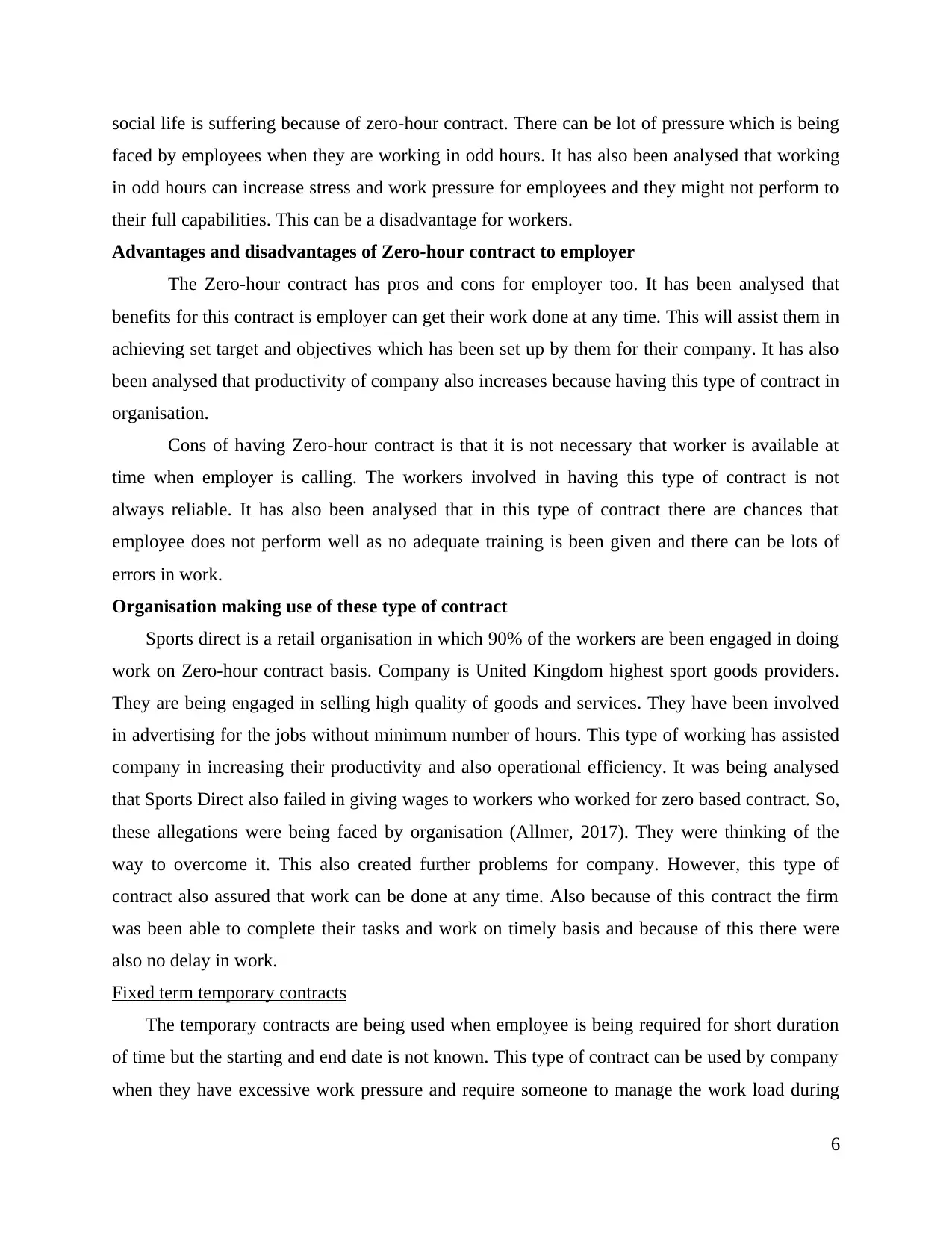
social life is suffering because of zero-hour contract. There can be lot of pressure which is being
faced by employees when they are working in odd hours. It has also been analysed that working
in odd hours can increase stress and work pressure for employees and they might not perform to
their full capabilities. This can be a disadvantage for workers.
Advantages and disadvantages of Zero-hour contract to employer
The Zero-hour contract has pros and cons for employer too. It has been analysed that
benefits for this contract is employer can get their work done at any time. This will assist them in
achieving set target and objectives which has been set up by them for their company. It has also
been analysed that productivity of company also increases because having this type of contract in
organisation.
Cons of having Zero-hour contract is that it is not necessary that worker is available at
time when employer is calling. The workers involved in having this type of contract is not
always reliable. It has also been analysed that in this type of contract there are chances that
employee does not perform well as no adequate training is been given and there can be lots of
errors in work.
Organisation making use of these type of contract
Sports direct is a retail organisation in which 90% of the workers are been engaged in doing
work on Zero-hour contract basis. Company is United Kingdom highest sport goods providers.
They are being engaged in selling high quality of goods and services. They have been involved
in advertising for the jobs without minimum number of hours. This type of working has assisted
company in increasing their productivity and also operational efficiency. It was being analysed
that Sports Direct also failed in giving wages to workers who worked for zero based contract. So,
these allegations were being faced by organisation (Allmer, 2017). They were thinking of the
way to overcome it. This also created further problems for company. However, this type of
contract also assured that work can be done at any time. Also because of this contract the firm
was been able to complete their tasks and work on timely basis and because of this there were
also no delay in work.
Fixed term temporary contracts
The temporary contracts are being used when employee is being required for short duration
of time but the starting and end date is not known. This type of contract can be used by company
when they have excessive work pressure and require someone to manage the work load during
6
faced by employees when they are working in odd hours. It has also been analysed that working
in odd hours can increase stress and work pressure for employees and they might not perform to
their full capabilities. This can be a disadvantage for workers.
Advantages and disadvantages of Zero-hour contract to employer
The Zero-hour contract has pros and cons for employer too. It has been analysed that
benefits for this contract is employer can get their work done at any time. This will assist them in
achieving set target and objectives which has been set up by them for their company. It has also
been analysed that productivity of company also increases because having this type of contract in
organisation.
Cons of having Zero-hour contract is that it is not necessary that worker is available at
time when employer is calling. The workers involved in having this type of contract is not
always reliable. It has also been analysed that in this type of contract there are chances that
employee does not perform well as no adequate training is been given and there can be lots of
errors in work.
Organisation making use of these type of contract
Sports direct is a retail organisation in which 90% of the workers are been engaged in doing
work on Zero-hour contract basis. Company is United Kingdom highest sport goods providers.
They are being engaged in selling high quality of goods and services. They have been involved
in advertising for the jobs without minimum number of hours. This type of working has assisted
company in increasing their productivity and also operational efficiency. It was being analysed
that Sports Direct also failed in giving wages to workers who worked for zero based contract. So,
these allegations were being faced by organisation (Allmer, 2017). They were thinking of the
way to overcome it. This also created further problems for company. However, this type of
contract also assured that work can be done at any time. Also because of this contract the firm
was been able to complete their tasks and work on timely basis and because of this there were
also no delay in work.
Fixed term temporary contracts
The temporary contracts are being used when employee is being required for short duration
of time but the starting and end date is not known. This type of contract can be used by company
when they have excessive work pressure and require someone to manage the work load during
6
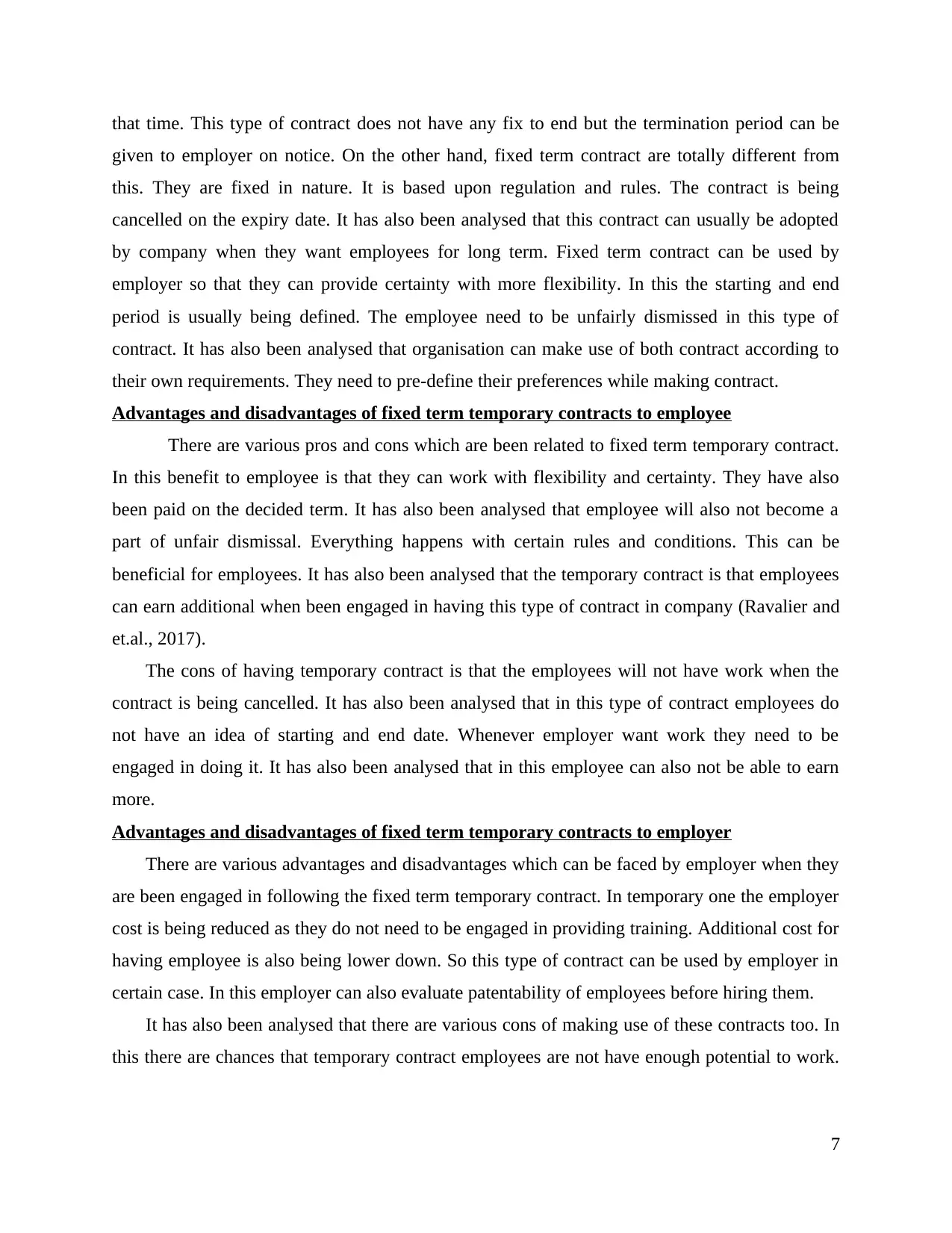
that time. This type of contract does not have any fix to end but the termination period can be
given to employer on notice. On the other hand, fixed term contract are totally different from
this. They are fixed in nature. It is based upon regulation and rules. The contract is being
cancelled on the expiry date. It has also been analysed that this contract can usually be adopted
by company when they want employees for long term. Fixed term contract can be used by
employer so that they can provide certainty with more flexibility. In this the starting and end
period is usually being defined. The employee need to be unfairly dismissed in this type of
contract. It has also been analysed that organisation can make use of both contract according to
their own requirements. They need to pre-define their preferences while making contract.
Advantages and disadvantages of fixed term temporary contracts to employee
There are various pros and cons which are been related to fixed term temporary contract.
In this benefit to employee is that they can work with flexibility and certainty. They have also
been paid on the decided term. It has also been analysed that employee will also not become a
part of unfair dismissal. Everything happens with certain rules and conditions. This can be
beneficial for employees. It has also been analysed that the temporary contract is that employees
can earn additional when been engaged in having this type of contract in company (Ravalier and
et.al., 2017).
The cons of having temporary contract is that the employees will not have work when the
contract is being cancelled. It has also been analysed that in this type of contract employees do
not have an idea of starting and end date. Whenever employer want work they need to be
engaged in doing it. It has also been analysed that in this employee can also not be able to earn
more.
Advantages and disadvantages of fixed term temporary contracts to employer
There are various advantages and disadvantages which can be faced by employer when they
are been engaged in following the fixed term temporary contract. In temporary one the employer
cost is being reduced as they do not need to be engaged in providing training. Additional cost for
having employee is also being lower down. So this type of contract can be used by employer in
certain case. In this employer can also evaluate patentability of employees before hiring them.
It has also been analysed that there are various cons of making use of these contracts too. In
this there are chances that temporary contract employees are not have enough potential to work.
7
given to employer on notice. On the other hand, fixed term contract are totally different from
this. They are fixed in nature. It is based upon regulation and rules. The contract is being
cancelled on the expiry date. It has also been analysed that this contract can usually be adopted
by company when they want employees for long term. Fixed term contract can be used by
employer so that they can provide certainty with more flexibility. In this the starting and end
period is usually being defined. The employee need to be unfairly dismissed in this type of
contract. It has also been analysed that organisation can make use of both contract according to
their own requirements. They need to pre-define their preferences while making contract.
Advantages and disadvantages of fixed term temporary contracts to employee
There are various pros and cons which are been related to fixed term temporary contract.
In this benefit to employee is that they can work with flexibility and certainty. They have also
been paid on the decided term. It has also been analysed that employee will also not become a
part of unfair dismissal. Everything happens with certain rules and conditions. This can be
beneficial for employees. It has also been analysed that the temporary contract is that employees
can earn additional when been engaged in having this type of contract in company (Ravalier and
et.al., 2017).
The cons of having temporary contract is that the employees will not have work when the
contract is being cancelled. It has also been analysed that in this type of contract employees do
not have an idea of starting and end date. Whenever employer want work they need to be
engaged in doing it. It has also been analysed that in this employee can also not be able to earn
more.
Advantages and disadvantages of fixed term temporary contracts to employer
There are various advantages and disadvantages which can be faced by employer when they
are been engaged in following the fixed term temporary contract. In temporary one the employer
cost is being reduced as they do not need to be engaged in providing training. Additional cost for
having employee is also being lower down. So this type of contract can be used by employer in
certain case. In this employer can also evaluate patentability of employees before hiring them.
It has also been analysed that there are various cons of making use of these contracts too. In
this there are chances that temporary contract employees are not have enough potential to work.
7
⊘ This is a preview!⊘
Do you want full access?
Subscribe today to unlock all pages.

Trusted by 1+ million students worldwide
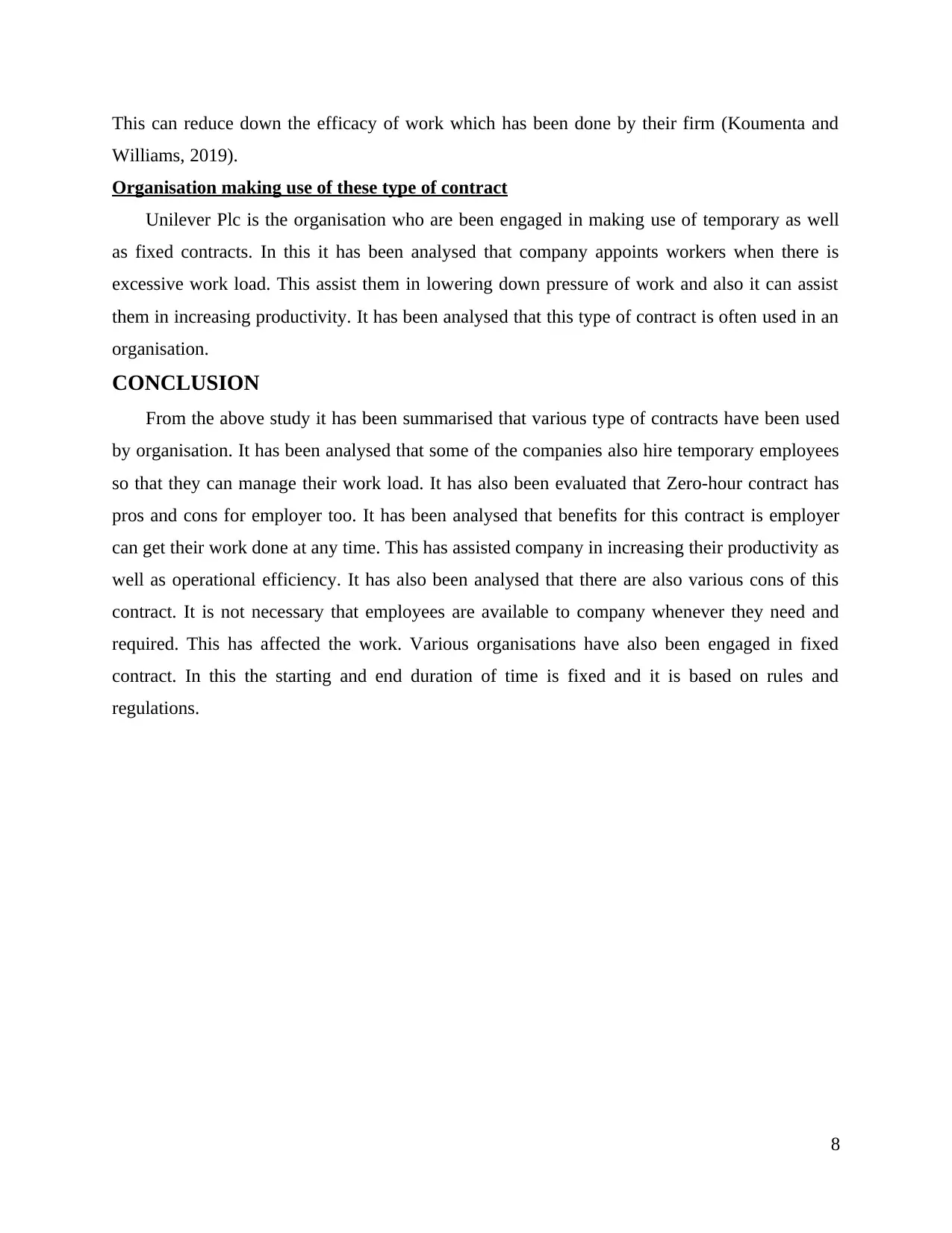
This can reduce down the efficacy of work which has been done by their firm (Koumenta and
Williams, 2019).
Organisation making use of these type of contract
Unilever Plc is the organisation who are been engaged in making use of temporary as well
as fixed contracts. In this it has been analysed that company appoints workers when there is
excessive work load. This assist them in lowering down pressure of work and also it can assist
them in increasing productivity. It has been analysed that this type of contract is often used in an
organisation.
CONCLUSION
From the above study it has been summarised that various type of contracts have been used
by organisation. It has been analysed that some of the companies also hire temporary employees
so that they can manage their work load. It has also been evaluated that Zero-hour contract has
pros and cons for employer too. It has been analysed that benefits for this contract is employer
can get their work done at any time. This has assisted company in increasing their productivity as
well as operational efficiency. It has also been analysed that there are also various cons of this
contract. It is not necessary that employees are available to company whenever they need and
required. This has affected the work. Various organisations have also been engaged in fixed
contract. In this the starting and end duration of time is fixed and it is based on rules and
regulations.
8
Williams, 2019).
Organisation making use of these type of contract
Unilever Plc is the organisation who are been engaged in making use of temporary as well
as fixed contracts. In this it has been analysed that company appoints workers when there is
excessive work load. This assist them in lowering down pressure of work and also it can assist
them in increasing productivity. It has been analysed that this type of contract is often used in an
organisation.
CONCLUSION
From the above study it has been summarised that various type of contracts have been used
by organisation. It has been analysed that some of the companies also hire temporary employees
so that they can manage their work load. It has also been evaluated that Zero-hour contract has
pros and cons for employer too. It has been analysed that benefits for this contract is employer
can get their work done at any time. This has assisted company in increasing their productivity as
well as operational efficiency. It has also been analysed that there are also various cons of this
contract. It is not necessary that employees are available to company whenever they need and
required. This has affected the work. Various organisations have also been engaged in fixed
contract. In this the starting and end duration of time is fixed and it is based on rules and
regulations.
8
Paraphrase This Document
Need a fresh take? Get an instant paraphrase of this document with our AI Paraphraser
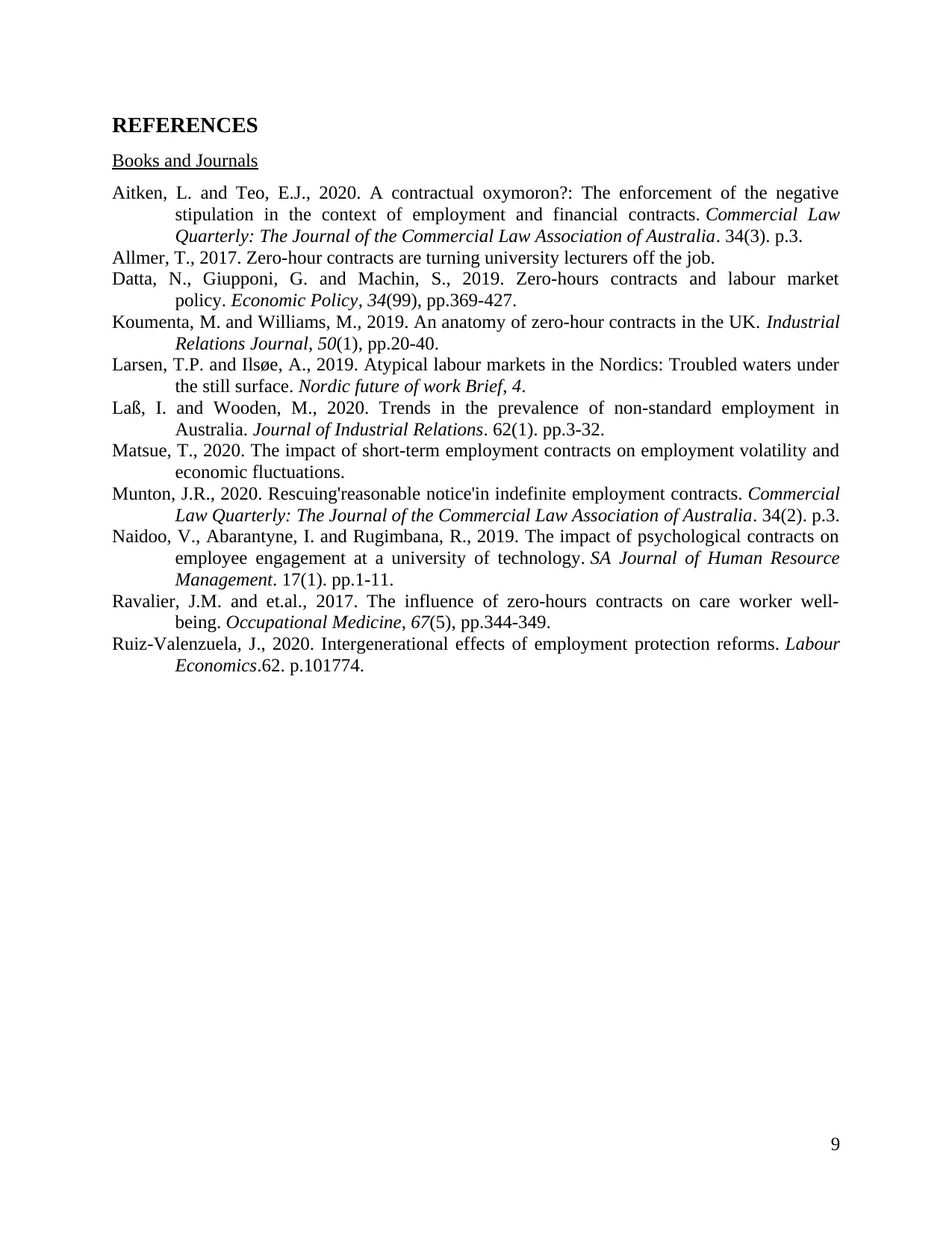
REFERENCES
Books and Journals
Aitken, L. and Teo, E.J., 2020. A contractual oxymoron?: The enforcement of the negative
stipulation in the context of employment and financial contracts. Commercial Law
Quarterly: The Journal of the Commercial Law Association of Australia. 34(3). p.3.
Allmer, T., 2017. Zero-hour contracts are turning university lecturers off the job.
Datta, N., Giupponi, G. and Machin, S., 2019. Zero-hours contracts and labour market
policy. Economic Policy, 34(99), pp.369-427.
Koumenta, M. and Williams, M., 2019. An anatomy of zero‐hour contracts in the UK. Industrial
Relations Journal, 50(1), pp.20-40.
Larsen, T.P. and Ilsøe, A., 2019. Atypical labour markets in the Nordics: Troubled waters under
the still surface. Nordic future of work Brief, 4.
Laß, I. and Wooden, M., 2020. Trends in the prevalence of non-standard employment in
Australia. Journal of Industrial Relations. 62(1). pp.3-32.
Matsue, T., 2020. The impact of short-term employment contracts on employment volatility and
economic fluctuations.
Munton, J.R., 2020. Rescuing'reasonable notice'in indefinite employment contracts. Commercial
Law Quarterly: The Journal of the Commercial Law Association of Australia. 34(2). p.3.
Naidoo, V., Abarantyne, I. and Rugimbana, R., 2019. The impact of psychological contracts on
employee engagement at a university of technology. SA Journal of Human Resource
Management. 17(1). pp.1-11.
Ravalier, J.M. and et.al., 2017. The influence of zero-hours contracts on care worker well-
being. Occupational Medicine, 67(5), pp.344-349.
Ruiz-Valenzuela, J., 2020. Intergenerational effects of employment protection reforms. Labour
Economics.62. p.101774.
9
Books and Journals
Aitken, L. and Teo, E.J., 2020. A contractual oxymoron?: The enforcement of the negative
stipulation in the context of employment and financial contracts. Commercial Law
Quarterly: The Journal of the Commercial Law Association of Australia. 34(3). p.3.
Allmer, T., 2017. Zero-hour contracts are turning university lecturers off the job.
Datta, N., Giupponi, G. and Machin, S., 2019. Zero-hours contracts and labour market
policy. Economic Policy, 34(99), pp.369-427.
Koumenta, M. and Williams, M., 2019. An anatomy of zero‐hour contracts in the UK. Industrial
Relations Journal, 50(1), pp.20-40.
Larsen, T.P. and Ilsøe, A., 2019. Atypical labour markets in the Nordics: Troubled waters under
the still surface. Nordic future of work Brief, 4.
Laß, I. and Wooden, M., 2020. Trends in the prevalence of non-standard employment in
Australia. Journal of Industrial Relations. 62(1). pp.3-32.
Matsue, T., 2020. The impact of short-term employment contracts on employment volatility and
economic fluctuations.
Munton, J.R., 2020. Rescuing'reasonable notice'in indefinite employment contracts. Commercial
Law Quarterly: The Journal of the Commercial Law Association of Australia. 34(2). p.3.
Naidoo, V., Abarantyne, I. and Rugimbana, R., 2019. The impact of psychological contracts on
employee engagement at a university of technology. SA Journal of Human Resource
Management. 17(1). pp.1-11.
Ravalier, J.M. and et.al., 2017. The influence of zero-hours contracts on care worker well-
being. Occupational Medicine, 67(5), pp.344-349.
Ruiz-Valenzuela, J., 2020. Intergenerational effects of employment protection reforms. Labour
Economics.62. p.101774.
9
1 out of 11
Related Documents
Your All-in-One AI-Powered Toolkit for Academic Success.
+13062052269
info@desklib.com
Available 24*7 on WhatsApp / Email
![[object Object]](/_next/static/media/star-bottom.7253800d.svg)
Unlock your academic potential
Copyright © 2020–2026 A2Z Services. All Rights Reserved. Developed and managed by ZUCOL.





